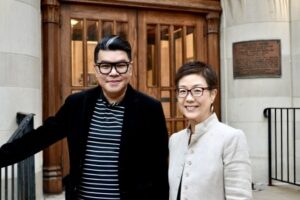Science for Seminaries Initiative: Dialogue on Science, Ethics, and Religion Program
January 14, 2022
 This article originally appeared in the Fall 2021 Science for Seminaries Newsletter
This article originally appeared in the Fall 2021 Science for Seminaries Newsletter
The American Association for the Advancement of Science (AAAS) is pleased to host a new initiative focused on incorporating science into theological education through its Dialogue on Science, Ethics, and Religion (DoSER) program. The Association’s Science for Seminaries Seed Grant Initiative, funded by the John Templeton Foundation, has provided one year of flexible funding to more than 10 seminaries accredited by the Association of Theological Schools (ATS).
The goal is to help students and faculty members feel more comfortable when interacting with science and technology topics and to build capacity for these schools to incorporate science more deeply into their theological education. Science topics to be covered include neuroscience, biochemistry, racism and public health, epigenetics, community health and well- being, digital technology, and mathematics.
Schools currently participating in the initiative include: Drew Theological School; Fuller Theological Seminary; Garrett-Evangelical Theological Seminary; Holy Apostles College and Seminary; John Leland Center for Theological Studies; Lutheran School of Theology at Chicago, Zygon Center; Mount Angel Seminary; Providence Theological Seminary; Regis College; Virginia Theological Seminary; and Wycliffe College.
The cornerstone of the Science for Seminaries project is a diverse and growing network of seminaries receiving expert support as they integrate science into their core curricula. Forty-two seminaries have now participated in the project, reaching thousands of seminary students since the project’s launch in 2014. This quarter, we checked in with three of those seminaries to meet their faculty and see what they’ve done so far as part of the Science for Seminaries Project.
“Through this seed grant, we have been able to create and curate an opportunity for the Garrett community to engage in exploring scientific, socio-cultural, psychological, and theological ways to understand a mutual and flourishing notion of the human with forms of relationality that brings about mutual healing,” said Dr. Rolf Nolasco, Jr., Rueben P. Job professor of spiritual formation and pastoral theology. Nolasco co-leads the “Race, Technology, and Healing: Science and Religion in Dialogue” project at Garrett-Evangelical with Dr. Wonhee Anne Joh, Henry R. Kendall Professor of Christian theology and postcolonial studies. “We believe that engaging in this question will offer our constituents practical wisdom and collective praxis and solidarity as we seek to embody and promote racial justice and the flourishing of all.”
As part of the “Person in Community” course offered this past fall, seminarians heard from Dr. Jay Forsythe, assistant professor of chemistry and biochemistry at the College of Charleston, who gave a lecture on the scientific exploration of human origins. In addition, a group of doctor of philosophy students of color, along with a few Garrett faculty, met as a reading group to discuss the beginning chapters of Ruha Benjamin’s book, Race After Technology (Polity Press, 2019). In both settings, students and faculty evidenced a strong and deepening interest in science and religion/theology at the intersection of race, gender, sexuality, class, and more.
Looking ahead, Dr. Philip Kurian, founding director of the Quantum Biology Laboratory at Howard University, will serve as the plenary speaker at a conference on “Human Flourishing,” hosted by Garrett-Evangelical this coming April. Held on April 29-30, 2022, additional details about the conference are forthcoming.
To learn more about the “Race, Technology, and Healing: Science and Religion in Dialogue” project at Garrett-Evangelical, go to https://www.garrett.edu/news/garrett-evangelical-awarded-science-seminaries-seed-grant-%E2%80%9Crace-technology-and-healing-science.

